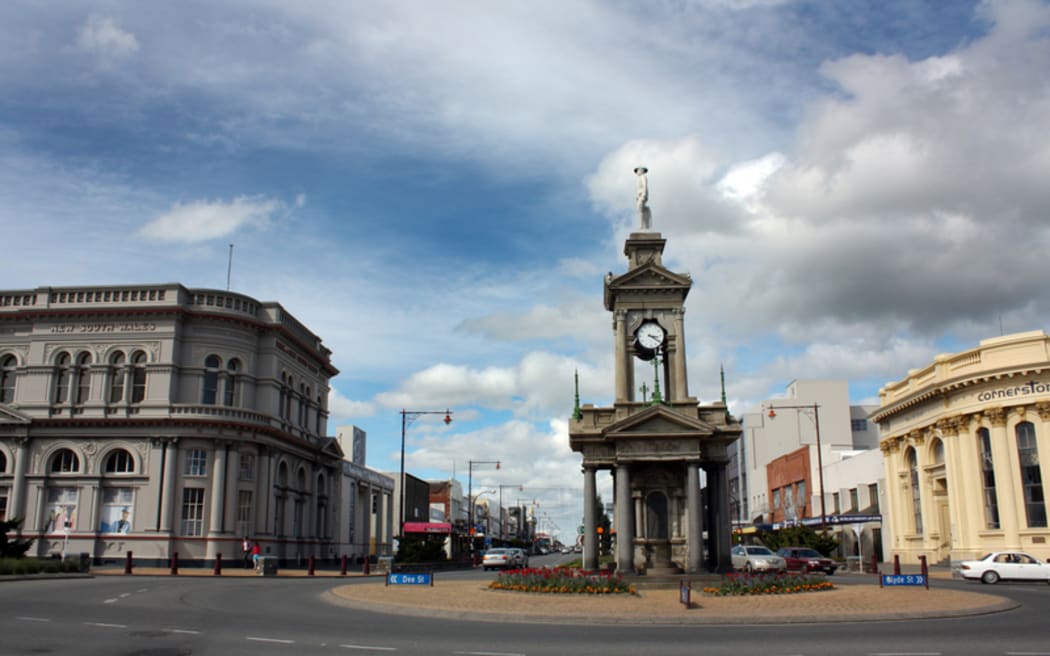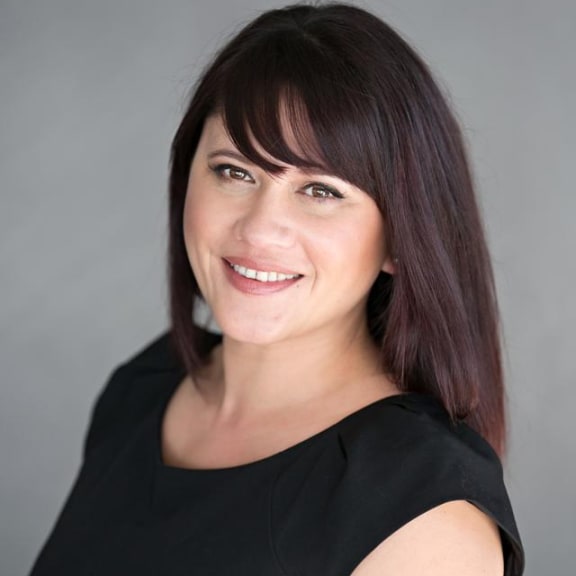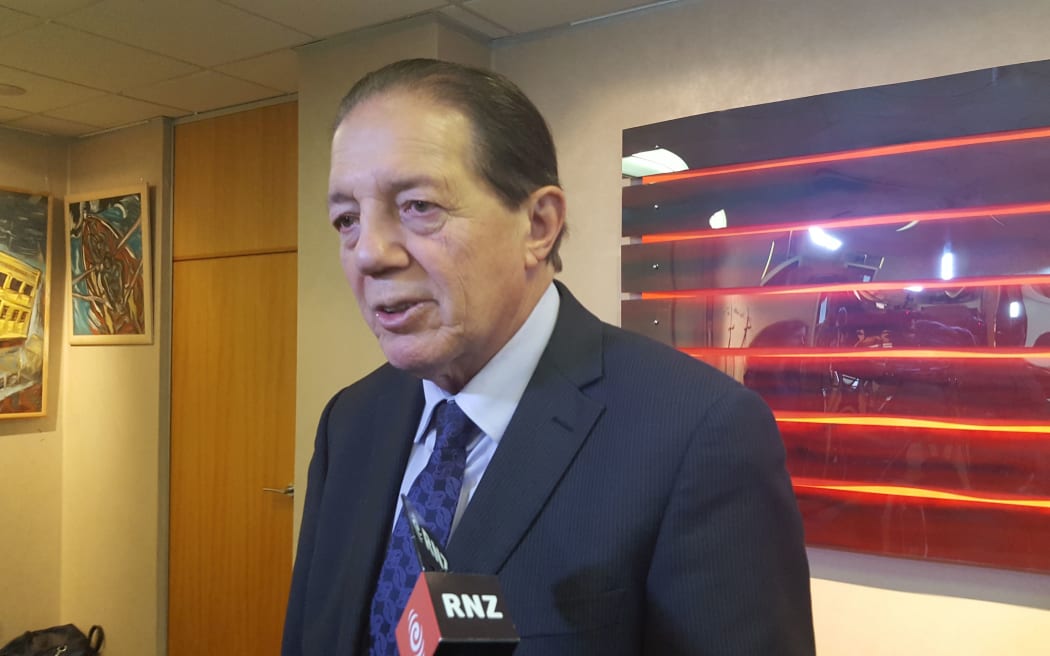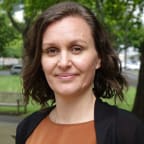Invercargill's leaders remain divided over whether the city is equipped to handle refugees, as it prepares to roll out the welcome mat to its first arrivals in December.

The Crescent in Invercargill's city centre. Photo: SUPPLIED / ICC
The city was chosen by the government this month as the country's seventh resettlement location, and Immigration New Zealand said the first two or three families would likely arrive in early December.
Fewer than 100 people per year from a variety of countries will be settled in the city, but the government's decision did not please everyone.
The city's mayor Tim Shadbolt has previously said he had concerns over shortages of housing and employment, and objected that his council had not been consulted by central government on whether Invercargill was suitable.
His comments were followed by an outpouring of racist comments on social media towards refugees coming to Southland, but prompted other leaders to express their willingness to help the new arrivals.
The Southland Chamber of Commerce has made three welcome videos, showcasing spokespeople from support services, business, and community groups all voicing their intention to help.
Mr Shadbolt is missing from the videos, except for a clip at the end where he is seen walking his dogs in his mayoral garb.
The Chamber said he had other commitments on the day the videos were filmed.
Southland's leaders and community organisations have since had two briefings with Immigration New Zealand, and district mayor Gary Tong said the government needed to "step up and help out" because Invercargill's services were stretched.
Several rural communities such as Winton and Riverton were willing and ready to take refugees, he said, and he had told Mr Shadbolt he might want to revise his initial public comments on the issue.
"Mayor Tim and I have had a discussion on this and I've said to him if they can't do it or are unable to do it, certainly the Southland District Council will step up, and I know that Mayor Tracy [Hicks] at Gore is in the same frame of mind."
Chamber of Commerce president Carla Forbes said Mr Tong's offer for refugees to settle in rural towns was feasible, as there were job opportunities in the dairy industry, which already employed migrant Filipino workers.
However, the Red Cross resettlement process means the refugee families will spend about a year in Invercargill to receive support services including English language classes and community integration.
Invercargill New Zealand First MP Ria Bond, who attended the INZ meetings, said while she welcomed the first arrivals, GPs were concerned there was a shortage of services in the city.

Ria Bond Photo: FACEBOOK
"The issue is, can we look after them?" she said.
The director of Family Works Southland, Judith McInerney, said it was difficult to know whether Invercargill would be able to cope, as exact numbers of refugee arrivals had not been finalised.
"We continually experience wait lists of two to four months for clients to get into some of our services and programmes," she said.
The service operated at a deficit, she said.
"We would like to be in a position to offer quick and adequate support for these refugees, but realistically we are already stretched and would greatly benefit from further funding and more resource."
Southern District Health Board medical directorate manager Janine Cochrane said once the DHB had "critical information" on numbers of refugees and their countries of origin, it could develop a pool of Invercargill interpreters.
Southland's Regional Development Strategy inclusive communities team leader Anna Stevens said bringing refugees to Invercargill was in line with the strategy's aim to bring 10,000 more people to Southland.
She said she worked with several community groups that were willing to help and while there was work to be done before December, there were "passionate people" working to get the city ready.
"We need to take a bit of a humanitarian perspective on refugee settlement, it's our duty as part of a global and international society to make ourselves available to assist these refugees.
"They've suffered horrific atrocities to get to here and I think we need to take a step back and remember why we're even having these discussions."
Immigration New Zealand "not in a rush" to start settlement
INZ's refugee division manager manager Andrew Lockhart said the December date for the first refugee arrivals to Invercargill was not fixed.
INZ would make several trips to the city in the next seven months to ensure a support framework was in place for the first arrivals.
He said Invercargill was selected because it had strong employment opportunities and enough housing.
He acknowleged Invercargill had a GP shortage but said INZ would "work through that".
Mr Lockhart said the government would continue to support the resettled families along with the Red Cross and the city council.
Tim Shadbolt stands by his concerns

Invercargill Mayor Tim Shadbolt. Photo: RNZ / Lydia Anderson
Several Southland leaders have expressed dismay at Mr Shadbolt's commments regarding refugees, but he said he was not backing down.
He said he did not regret voicing his concerns, and had not paid any notice to the online backlash towards refugees.
"I don't live in cyberspace so I don't know what goes on there but I can only express my concerns and I've got the interests of the people of Invercargill at heart."
Mr Shadbolt said although a government representative met with him to inform him Invercargill would become a resettlement location, he was never consulted for his views on it.
"He simply said you have been chosen for refugee resettlement. We understand consultation in local government means engaging with the parties concerned ... and allowing us to make submissions."
The city did not have enough housing or enough jobs, despite what the government data showed, he said.
"They say that we've got jobs because of the low unemployment levels in Invercargill, but that's because there's still a stigma attached to going on the dole here."
Locals who could not get jobs left the city to seek work elsewhere, he said.
Mr Shadbolt acknowledged he had no choice but to go along with the government's decision, but said he had no trust in the government to provide long term support to the refugees.
"The government says we'll give them jobs, we'll give them houses, but it's only for a year, and then what happens?"
He said he would be working with Dunedin City Council to learn what had been successful during its past year of assisting 50 Syrian families to resettle.


